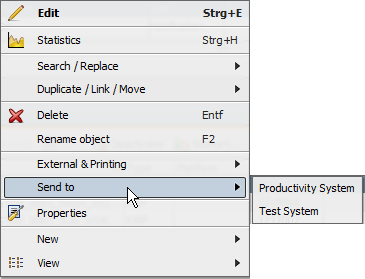
|
UC_SAP_JXBP_EVENTTYPES - Event Types of the Java Scheduler in SAP |

Settings in Variables |
UC_SNMP_VALUES - SNMP Values |

|
 UC_SENDTO and UC_SENDTO_ACT - Handling Objects and Tasks Internally/Externally
UC_SENDTO and UC_SENDTO_ACT - Handling Objects and Tasks Internally/Externally
In these two variables, you can define commands for calling external programs and internal objects.
|
Key |
Value |
New start required |
|---|---|---|
|
Description of the menu command |
Path and name of the program -f%01 |
UserInterface |
|
Description of the menu command |
Name of an executable object |
UserInterface |
variables are supplied with client 0000. From there they can be copied into your own client and customized to your requirements.
In order to allow for easier distinction, the variable "UC_SENDTO" (context menu of the Explorer) is available for objects and "UC_SENDTO_ACT" (context menu of the Activity Window) for tasks.
You can handle objects and tasks AE-internally but also externally with your own programs, thereby transferring object codes. The Send To menu in the context menu of the UserInterface is created according to your definitions made in the variable. The Send To sub-menu lists all the specified programs and executable objects in alphabetical order. Highlight one or more objects or tasks to call the menu command as shown below:

Note that the menu Send to is also available in the context menus of monitors and in the Search function.
Changes made in these two variables only become effective in the UserInterface after a restart.
Internal Handling
Here, object codes are transferred to objects that are able to be activated. The keys you define are used as menu commands of the Send To menu. In the Value column of the variable you specify the names of the objects to be called. Note that the specified object is started for each highlighted object/task.
The following variables are automatically supplied in the read/input buffer:
|
Variable |
Description |
|---|---|
|
&OH_IDNR# |
Object code |
|
&NAME# |
Name of the object/task |
|
&TYPE# |
Type of the object/task |
|
Additionally for tasks: |
|
|
&RUN# |
Run number (RunID) of the task |
|
&LNR# |
Placement in workflows and schedule |
|
&PARENT_RUN# |
Run number (RunID) of the superordinate task |
|
&PARENT_NAME# |
Name of the superordinate task |
|
&PARENT_TYPE# |
Object type of the superordinate task |
Use the script statement :READ to read these variables. The option Generate at runtime , however, must not be activated (Attributes tab).
Example:
:READ &NAME#,,
:PRINT &NAME#
:READ &TYPE#,,
:PRINT &TYPE#
:READ &PARENT_RUN#,,
:PRINT &PARENT_RUN#
External Handling
You can define menu commands in the variables for calling your own programs in order to handle objects and tasks externally.
The keys you define are used as menu commands for the Send To menu. In the Value column of the variable you specify the names of the programs followed by the parameter -f%01. This parameter serves to assign a temporary file (SEND_TO_n.txt) containing the codes of the highlighted objects.
The content of this temporary file is clearly structured. The first line contains the name of the AE system, the client and the user who started the program call. The object codes are then listed one below the other.
Example:
UC4 - 0150 - SMITH/UC4
3486524
12234
3097486
1512
|
Key |
Value |
|---|---|
|
Determining Schedule data (Script) |
SCRI_SCHEDULE_DATA |
|
Test system |
C:\AUTOMIC\TRANSPORT.EXE -f%01 |
See also:
Overview of all variables
in table form
Variable